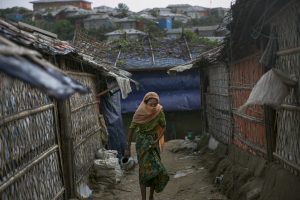Instead of marking Myanmar’s continued march towards democracy, elections in Myanmar next month will be most notable for their contribution to the Myanmar government’s attempts to extinguish the identity of the Rohingya people – and the international community is already poised for complicity.
Politics and elections in Myanmar have always been tangled with matters of identity and citizenship. But in the 2020 elections, the Rohingya are being disenfranchised en masse because of their ethnicity. The electoral process is proving yet another bureaucratic procedure that serves to erase their legal existence and compound the ongoing genocide against them.
The reality is the November 8 elections in Myanmar will be neither free nor fair – and certainly not inclusive. Foreign governments, including the European Union (EU), have become complicit in denying the Rohingya identity. The EU recently funded a smartphone application aimed at giving users easy access to information on parliamentary candidates. The app was a great idea, except that it overtly denies the existence of Rohingya, instead referring to the group as “Bengali.” The smartphone application also categorizes parliamentary candidates based on their “race” and “religion,” which is only likely to inflame Myanmar’s fraught politics, doing more harm than good.
The EU along with its partners the Asia Foundation and the International Institute for Democracy & Electoral Assistance (International IDEA) launched the smartphone application. Later, International IDEA said in a statement it withdrew its association with the app saying it could “adversely affect election security and integrity.”
However, be it through miscalculation or willful ignorance, the EU and its other partner the Asia Foundation continues to stand by the app and entrench discrimination in the name of “democracy.”
On October 22, the EU along with other donor governments will hold a donor conference to “promote support for Rohingya refugees and host countries.” All involved should ensure that funds are not allocated to systems which entrench persecution and discrimination, including the erasure of the Rohingya identity.
Myanmar’s Union Election Commission has rejected several Rohingya candidates running for office in recent months and one Myanmar Muslim in Mon State. Most recently Aye Win – a Rohingya candidate from the Democracy and Human Rights Party – was disqualified from running in the elections. He was previously included in the troubled smartphone application, with his ethnicity unwittingly listed as “Bengali,” and now he is unable to participate in political life.
The EU and other governments should realize that Myanmar has, for years – including under the National League for Democracy (NLD) government – been adamant at erasing and denying the identity of the Rohingya as a distinct ethnic group.
In 2017, the Myanmar military led large-scale genocidal attacks against Rohingya men, women and children, forcing hundreds of thousands to flee to Bangladesh. Three years on, and the government continues to push an oppressive citizenship process, requiring Rohingya to accept National Verification Cards (NVCs), which require them to identify as “foreigners,” effectively erasing their identity and right to citizenship.
In 2019, our organizations Burma Human Rights Network and Fortify Rights released two separate reports exposing a systematic campaign by Myanmar authorities to erase the identity of Rohingya Muslims. Our reports document how authorities have coerced Rohingya civilians into accepting NVCs in order to travel and in exchange for access to subsistence livelihoods, creating severe economic pressure on those who refuse to identify as “Bengali” or other identities.
The government of Myanmar says the NVC will confer more rights for the Rohingya but in reality the opposite is true. There are an estimated 600,000 Rohingya in Myanmar, many confined to more than 20 ghetto-like internment camps. Those forced or coerced to accept NVCs continue to experience draconian restrictions on their everyday lives.
Yet in a human rights statement this month by the EU and Myanmar there was no mention of the name “Rohingya,” despite their treatment being one of the most serious human rights issues of our time.
These problems aren’t new. Under General Ne Win, the former military commander who also served as prime minister, the government drafted the controversial 1982 Citizenship Law, which denies access to full citizenship for individuals who do not belong to certain “national” ethnic groups determined by the government. Myanmar relies on an arbitrary and disputed list of 135 recognized ethnic groups that excludes Rohingya and other Muslim ethnic minorities.
Based in part on race, the 1982 law creates three categories of citizenship – full, associate and naturalized citizens – each with varying rights and accompanying identification cards.
The honeymoon period for Myanmar’s “transition” to democracy is over. Foreign governments should push Myanmar to recognize the Rohingya, facilitate their right to vote and amend the discriminatory citizenship law. Governments should also acknowledge that what is happening to Rohingya constitutes genocide, and they should redouble efforts to ensure the perpetrators are brought to justice.
The NLD-led government is culpable in the genocide of the Rohingya and can no longer be handled with kid gloves. Should the NLD emerge from the 2020 elections as the leader of government in Naypyidaw, international support and recognition for Myanmar’s democratization and economic development can no longer be delinked from the genocide of the Rohingya. The time for action is long overdue.
Kyaw Win is the Executive Director of Burma Human Rights Network. John Quinley III is a Senior Human Rights Specialist with Fortify Rights. Follow them on Twitter: @kyawwin78 and @john_hq3.

































